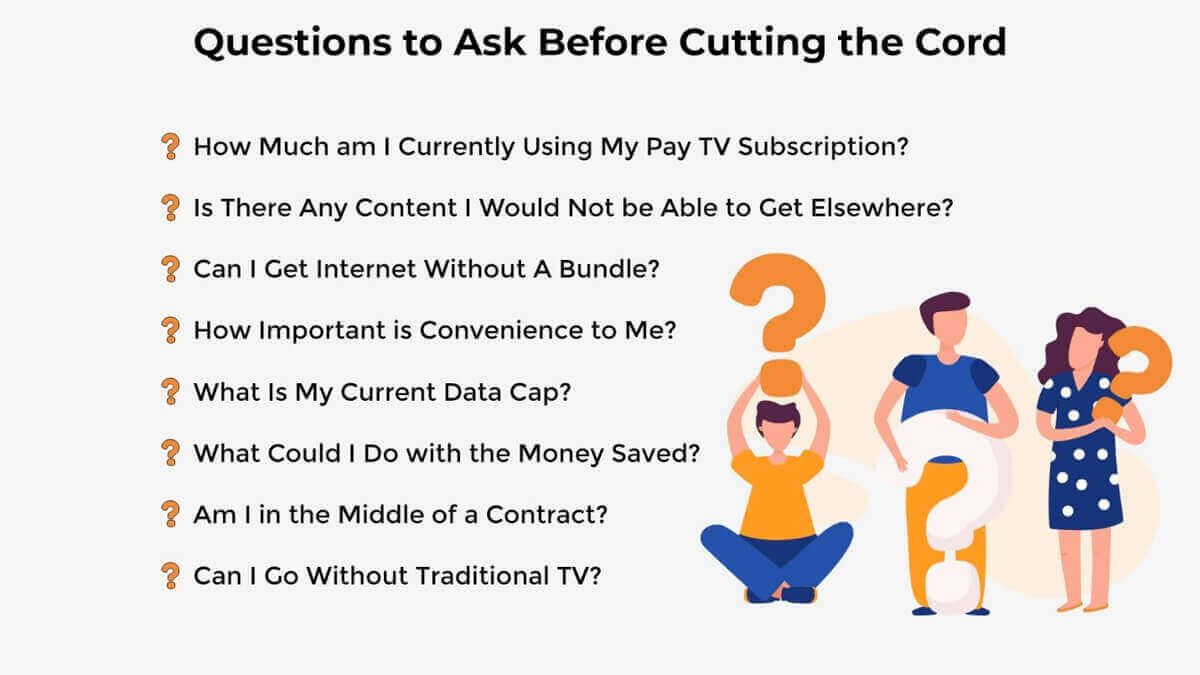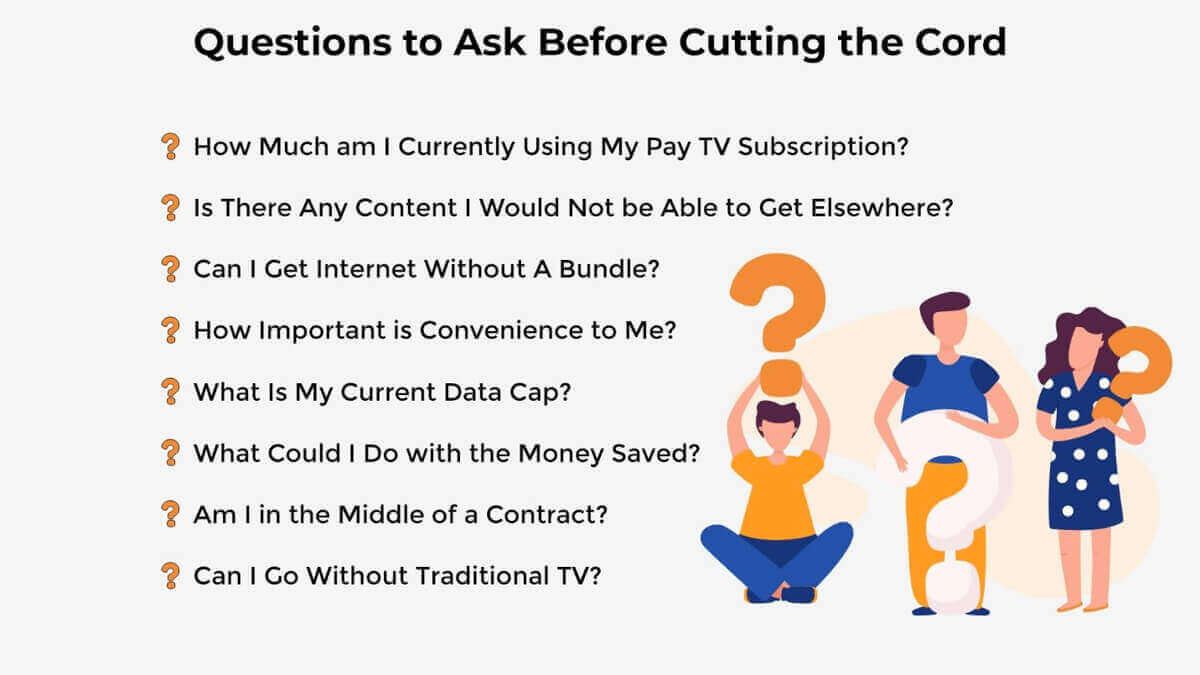Ready to Cut the Cord on Cable TV? Ask These Questions
Cutting the cord. It means canceling your cable TV and moving to alternative forms of entertainment.
You’ve probably thought about it a few times, either because you’re frustrated with cable company services or you simply want to pay less for your cable TV bill. Maybe you aren’t even using your current cable TV subscription and are only stuck with it because of a bundle with internet.
Your frustrations can easily be resolved, and your wallet’s burden lightened. Millions of people have cut the cord on cable TV, and it’s never been easier. You just need to know the right questions to ask before you through with it.
So whether you’re just curious or ready to grab the wire cutters, here is everything you need to know:
Questions to Ask Before You Cut the Cord on Cable TV
Cutting the cord might not be for everyone. If you do go for it, there are multiple alternatives to cable TV, and you’ll have to decide which you want. You may even find that just reducing your cable TV package is the best choice.
Here is a list of questions to ask before you call your cable TV provider to cancel.

How Much am I Currently Using My Pay TV Subscription?
While delving into the costs of your cable subscription might be anxiety-inducing for some, the truth of the matter is that you need to know the facts before you make any decisions. A bit of paperwork now can save you a lot of time or money later. Fortunately, in the digital age, chances are you can find all the important information online through your provider’s website.
Don’t look at what you could be paying or what you’re paying with a discounted rate, but what you’re paying right now and what you can expect to pay when your introductory rate passes. Even the thought of cutting the cord will make many pay TV providers do everything in their power to convince you to stay, even if it isn’t in your best interest. They are often less than forthcoming about the terms and conditions: only the hard numbers and binding promises matter.
Is There Any Content I Wouldn’t be Able to Get Elsewhere?
Sometimes it can be difficult to find some shows and events elsewhere. This is especially true if it’s a clear draw for a network (and thus behind a paywall for a while) or so obscure or otherwise popular that networks and producers wouldn’t bother putting it elsewhere. The easiest way to do this is to simply create a list of everything you considered a “must-watch" program or event in the last couple of months. You might find the list shorter than you expect after some reflection.
After this, get ready to settle down and do a little searching. See if websites are streaming those same programs and events either live or just shortly after the initial broadcast. You can also check digital stores if recordings are available (usually only for a few dollars).
We’ll get into a few more of the specifics and reasons later, but you should know that often that the answer to this question is “no." Networks and content providers want as many eyes on their programming as possible, especially if they can get some additional income from it in one form or another. Even the most exclusive content doesn’t remain exclusive forever.
Can I Get Internet Without A Bundle?
Unfortunately, you should know that only one or two telecommunications or cable and internet providers operate in some areas, and you’ll have little option but to choose between them. There are a few other options such as satellite internet, but they are usually either unworkable, far too expensive for what you’re getting, or otherwise even worse than your few options.
The above means that some companies will feel they can get away with not even offering an internet-only option, making that option unreasonably expensive, or only including the best (or even good) internet speeds in the cable bundles. Ordering a new service online won’t even provide you with the option, and sales agents will steer you away from the possibility. You will want to check to see if an internet-only option is reasonably available in your area before you cancel anything.
However, don’t let those companies strongarm you into a deal or cable service you don’t want. They want your business, and often careful yet steadfast negotiation will allow you to get the service you need. While not every case may be workable, hold out as best as you can for a better position.
How Important is Convenience to Me?
A cable subscription can sometimes be convenient, especially if you don’t want to scroll through endless suggestions and instead just want to turn on the TV and keep it on in the background. Some on-demand options offered through pay-TV plans make matters more convenient for you and might be best for some families.
However, there is another side to all this. Most people who have cut the cord can more easily watch what they want, when they want, where they want, just by the very nature of the services, websites, and tools they use. And while cable companies are trying to create on-demand apps and services to match the top streaming options, they haven’t gotten up to par yet.
There are many other considerations that will vary from potential setup to potential setup, but weighing the scales will be vital for you and your family to be sure you’ve made the right choice.
The last thing to mention is that if you wind up cutting the cord, you might need to set up and get used to a few new things before getting entirely comfortable. These are temporary inconveniences, and once you get used to a new routine, they aren’t something to worry about, so measure them accordingly. Adjustments are almost always worth the investment.
What Is My Current Data Cap?
Many internet plans have data caps listed as part of the plan where you’ll find your internet is throttled (and thus often unusable, at least for streaming) after you reach it each month, or you’ll have to pay extra for a larger data cap. Other past plans have soft data caps where people report slower speeds after a certain usage point, even with advertisements offering “unlimited" access.
In most cases, you should be fine, but if you have satellite internet or another setup that isn’t so common or often has a relatively strict data limit, then you might want to consider your options. Netflix uses a lot of data, to the point where internet providers have attempted to get Netflix to pay extra for internet usage and that Netflix is by far the largest single bandwidth user. Other streaming services aren’t necessarily different, so people who plan to use them often might find their caps reached far too quickly.
Before cutting the cord, check to see if a data cap would apply to your service and whether your household would be at risk of running into problems with it. The answer could strongly affect your decision to cut the cord or which service you go with.
What Could I Do with the Money Saved?
This is a simple question of opportunity cost. Think briefly about what you could do with an extra $30-50 a month. While you may want to siphon some of this into paying for other forms of entertainment, equipment, and streaming services, you’ll likely have some money, if just a little bit leftover.
What would you do with that money? Even $400 saved every year could go towards another bill, paying down debt, a nice dinner every month, and many other possibilities. Saving up for a life-changing experience or vacation might be worth the sacrifice of cutting the cord, to say nothing of the time saved watching meaningless programs.
Are the possibilities better to you than how you feel about your cable plan? If so, that’s a strong indicator that it’s time to cut the cord.
Am I in the Middle of a Contract?
Often cable companies will lock you into a deal for a year or two at a lower rate to ensure that you stick with them. Often the costs of breaking these deals by cutting the cord (if you even can) are higher than the money you would save by cutting. In these cases, it’s best to wait it out and make absolutely certain that you get out of the deal you don’t want at the right time.
However, we don’t suggest you give up right away if you’re in such a contract. As explained later, you might still have options.
Can I Go Without Traditional TV?
While this will overlap somewhat with previous topics, cutting the cord often comes down to this one simple question. Television, as we know it, has become such a staple of most people’s lives that they can’t imagine life without it. While we won’t go so far to say that people are dependent on it, it is a comfort many people would be extremely hesitant to go without. Others won’t give this question a second thought and already know they can go without just fine, given how little they use the TV.
If you’re still on the fence, do a trial run. Perhaps unplug your cable box or equivalent device for a week, and don’t give in to temptation. Allow everything else, including streaming services and access to whatever you would have otherwise. See how you and your family feel at the end of the week. If it wasn’t a struggle, you’re ready to cut the cord. It might seem like a bit of an excessive measure, but it’s sure to give you the right answer.
It Shouldn’t Be a Difficult Process
Cutting the cord and potentially signing up with a new internet provider doesn’t have to be a difficult process. There are websites willing to help and customer service departments that will happily assist you in making every step required to move you to their service. As mentioned earlier, it can and will be more trying for some people, but if there’s more competition in your area, you will have a much better time getting exactly what you’re looking for.
Additionally, while canceling your current bundle might be difficult if you’re in the middle of a contract, you might be able to get a competitor to buy out that contract. If you’re switching to internet only, you might not have to pay any cancelation costs (especially if you’re getting a more expensive plan). Much more is negotiable than you might first think.
You Won’t Be Alone
Millions of people in the United States and beyond have already cut the cord and are happy with their decision. While numbers might be slightly skewed based on people who never get cable after moving out on their own, the processes are in place for people to cut the cord and many services are happy to pick up the slack when it comes to your entertainment.
With all this in mind, take comfort in the fact that in addition to this resource, you’ll be able to find many accounts and reports of people cutting the cord successfully and happily. It’s quite likely you have a friend or family member you can talk to about the process, as well as someone in your area you can trust who had the same options for internet as yourself.
You Will Want to Think Long Term
Sometimes sticking with your current deal might be good for the short term when the price of your bundle looks appealing, but beyond the first year or two of your contract with your service provider, what do you think you’ll be paying each month?
When cutting the cord, the other thing to consider is depending on the devices you get to fill in the content gap, you might be parting with a bit of money at the start (assuming you want to get everything at once). While this might frighten you, you should also remember that you won’t be paying monthly installments on those things unless you put them on credit. Spending $200 now is better than spending $50 every month for the rest of your life, even if you consider device replacement costs every few years.
Internet Service Options
Before you go ahead and cancel your cable, you should likely check to see which internet services are available in your area, as mentioned in one of the previous sections. You don’t want to find yourself with limited options and are forced to go back to your original provider. Unless you’re moving, you will want a smooth transition (and you’ll likely want one even if you are moving).
Not only should you check to see what providers you have available, but you should also consider the internet speeds and service plans available. For streaming and handling everything you could possibly want, we recommend at least a download speed of 100Mbps or higher (going up to gigabit internet, which will let the entire family effectively do whatever they want). If none are available, we recommend making sure that you have at least 25Mbps, or else you should reconsider cutting the cord as you might not be able to stream or easily use the internet.
While upload speeds are rarely as of much concern to the average user, aim for speeds of at least 10Mbps when possible. This should allow you to perform typical household and leisure activities on the web.
If you find yourself with limited options, many smaller cities or even larger towns are trying to set up community internet service providers, many of which offer great speeds and use existing infrastructure. If you can’t cut the cord now, showing interest or looking into them might allow you to cut the cord later down the line.
Devices You Might Want to Have to Fill the Gap
If you’re getting rid of your cable subscription, no one is going to take your television set away. Instead, you’re still likely to use it for most of the same things, just without a cable wire coming out of the back of it.
If you have a smart TV, other devices listed here might not be as necessary. If you have one, we recommend checking and seeing what apps and services are compatible with it as it came out of the box. After this, you may want to check how many HDMI ports, ethernet cable slots, USB ports, and other related ports it has so you know how many different devices you can easily hook up to your television.
If you have an older television and don’t want to upgrade right now, things might be a bit more complicated, but you can rest assured that there’s an adaptor for nearly everything (most are cheap), and a quick online search will give you the answers.
Yet, with so many different options for consumer electronics and media centers on the market, what do you need? We recommend one or more of the following to start with:

A Gaming Console: A gaming console can handle most of your streaming needs, on top of other things. Most can play any modern disc media, and there’s also usually an online store attached to get apps and other media you might want right on the console. If your household doesn’t have any gamers, it might be best to consider other options, as these devices can get rather expensive.
We would also like to mention that for the moment, we wouldn’t recommend the Nintendo Switch for cord cutters as its streaming options are far more limited.
An OTA DVR: If you still like the idea of having some television in your home, then it isn’t difficult to compromise and get an OTA DVR. Ranging in price from about $100-$300, these devices, after a bit of setup, allow you to easily watch broadcast TV in your area (meaning the major and local networks are available) as well as record the programs. Different models will allow you to have different perks and functions, but fundamentally all of them will be able to provide you with the same programming.
Internet Streaming Devices: Whether it’s an Apple TV, Roku, Amazon Fire TV, or something else, you will want to look into what these devices have to offer to see if one of them fits the needs of your family. You may already have everything required if you have a gaming console, smart TV, or something else which can easily bring streaming services to your screen, but we recommend keeping your options open.
Chromecast: It’s incredibly convenient to be able to stream from your phone or computer right to your TV, and for a low cost, that’s precisely what a Chromecast does. Whether it’s the ease of looking up YouTube videos, simply wanting to watch things on a larger screen, or another reason, the Chromecast is a worthy investment for many homes.
A Blu-Ray Player: A much simpler option, albeit in our opinion, an unnecessary one, is to get a simple Blu-ray player to handle all disc media that is in or will be in your home. They range in price heavily depending on their additional features and are best for people who don’t need the added functionalities of the devices listed above.
You Can Still Watch Just About Everything
If you’re willing to pay, you will be able to keep watching your favorite shows, and with the alternative options available to you, you will be able to do so for less cost, without commercials, and at your convenience. In some cases, you might need to spend a few dollars to watch an episode of your favorite show quickly online (or some more for a season). It’s still cheaper than a cable subscription provided you aren’t doing so for half a dozen shows.
And if you’re worried you’re going to miss many of your favorite major network shows live, network TV can be easily watched via an OTA DVR. Major sports organizations such as MLB and the NFL have their own online access passes that are improving every year and allow you to watch far more games. Soon there will be little to nothing exclusive to television.
You Will Be More Deliberate with Your Viewing
A small addendum to the previous section is that you will likely feel better about shows you choose to watch than the shows you passively put on as the result of having nothing else to do. While you may want to engage in lazy viewing from time to time, picking something semi-random from your streaming service of choice can provide the same effect, without commercials.
You could even use cutting the cord as an opportunity to expand your boundaries, trying other forms of media, or learning new hobbies. Cutting time away from TV and video doesn’t mean you have to keep spending it watching something else.
A New Service Provider Might Be Happy to Help
If you feel trapped in a current contract or that it will be challenging to make the switch, you might be able to get help via the customer support team of another company you’re considering for internet service. If you’re willing to commit to them, many providers will be happy to buy out your current contract to get your business.
And while this is less likely, they may also be willing to help you settle out of cable as you get started with your new service as part of the installation. You’ll still need to work with your cable provider and perhaps send some equipment back yourself, but your new provider might be willing to set you on the right path.
Conclusion
Cord cutting can be a major decision, but it’s also one that will benefit many families and save them hundreds if not thousands of dollars over the next few years. Now that we’re well into the year 2020, there’s no reason you shouldn’t be able to find all the entertainment you want (and the exact entertainment you want) using just an excellent internet connection. Whatever your choice, we wish you the best and hope you have an easy time in the future.

